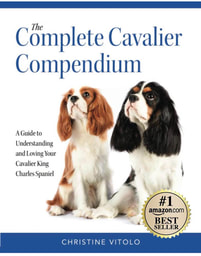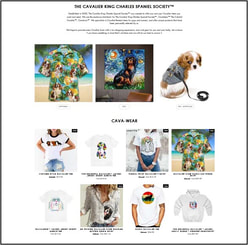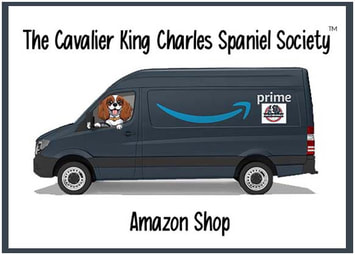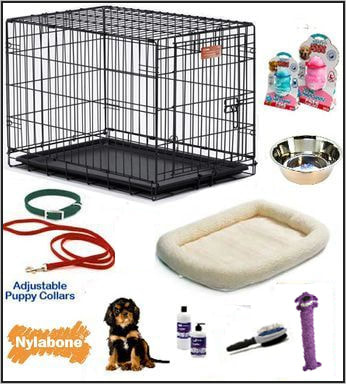ROYAL FLUSH CAVALIERS
THE CROWN BREEDER OF CAVALIERS TM
Email: [email protected] * Phone: 401.213.6333
Supplies and Care
All puppies need routine veterinary care, including regular exams and vaccinations. Pay attention to their diet, activity level, and dental hygiene. A proper diet, moderate exercise, and regular dental cleanings are essential for your dog's long term health. Cavaliers are moderate shedders, so grooming every 8 weeks is advisable. Keeping their coat short can help manage shedding. Regularly check and clean their ears, especially after baths, to prevent moisture or wax build up that can cause irritation or infection.
Cavaliers are sweet, social, and intelligent dogs, making them easy to train with consistency. Consider puppy socialization classes and professional trainers if you lack experience and want efficient training. You don't need a large yard for a Cavalier. This breed is highly adaptable and can thrive in a Manhattan studio or a spacious farm. They can get sufficient exercise indoors or on daily walks. Cavaliers are known for their love of companionship and prefer being with you rather than alone outside. They will quickly learn to go outside for bathroom breaks but generally prefer being indoors with their family.
This page includes a list of considerations for your new puppy, along with products we use, recommend, and love. You'll also find links to more information on these products both here and in our online store. If you have any questions, please feel free to reach out.
All puppies need routine veterinary care, including regular exams and vaccinations. Pay attention to their diet, activity level, and dental hygiene. A proper diet, moderate exercise, and regular dental cleanings are essential for your dog's long term health. Cavaliers are moderate shedders, so grooming every 8 weeks is advisable. Keeping their coat short can help manage shedding. Regularly check and clean their ears, especially after baths, to prevent moisture or wax build up that can cause irritation or infection.
Cavaliers are sweet, social, and intelligent dogs, making them easy to train with consistency. Consider puppy socialization classes and professional trainers if you lack experience and want efficient training. You don't need a large yard for a Cavalier. This breed is highly adaptable and can thrive in a Manhattan studio or a spacious farm. They can get sufficient exercise indoors or on daily walks. Cavaliers are known for their love of companionship and prefer being with you rather than alone outside. They will quickly learn to go outside for bathroom breaks but generally prefer being indoors with their family.
This page includes a list of considerations for your new puppy, along with products we use, recommend, and love. You'll also find links to more information on these products both here and in our online store. If you have any questions, please feel free to reach out.
WHAT TO READ
Our books are available for purchase on Amazon and Barnes and Noble.
We have also served as an expert contributor on other projects, including a nationally published handbook
Click on a photo below to view or purchase
Our books are available for purchase on Amazon and Barnes and Noble.
We have also served as an expert contributor on other projects, including a nationally published handbook
Click on a photo below to view or purchase
FOOD
We feed all of our dogs BUTCHERBOX PET products while also incorporating regular food.
For more information on BUTCHERBOX PET, please visit our BUTCHERBOX page
HUMAN FOOD
In addition to a commercial dog food you can also add regular food into your dog's diet.
For additional details, recipes and a list of dog safe foods to make your own, check out our book:
The Culinary Cavalier TM: Cooking Comforts and Creations for Your Cavalier
PORTION CONTROL
Due to their predisposition to weight gain and cardiac issues, practice strict portion control.
Adjust portions based on your Cavalier's weight, age, and activity level.
Regularly monitor their body condition and consult your veterinarian for guidance.
HYDRATION
Ensure constant access to fresh water to support overall health and proper kidney function.
Regular Veterinary Exams: Schedule regular veterinary appointments to monitor your Cavalier's weight, cardiac health, and overall well being.
Your veterinarian can provide insights into any necessary dietary adjustments based on their individual health status.
BOWL
We recommend stainless bowls as puppies cannot chew them up.
Buy two bowls (food and water)... smaller sizes are fine.
TREATS
In addition to ButcherBox Pet, we also use Old Mother Hubbard Biscuits (all flavors).
Visit their website at: www.oldmotherhubbard.com for additional information
We also recommend rope toys, nylabones and kongs. Do not give your pet rawhide and avoid edibles made in China.
We feed all of our dogs BUTCHERBOX PET products while also incorporating regular food.
For more information on BUTCHERBOX PET, please visit our BUTCHERBOX page
HUMAN FOOD
In addition to a commercial dog food you can also add regular food into your dog's diet.
For additional details, recipes and a list of dog safe foods to make your own, check out our book:
The Culinary Cavalier TM: Cooking Comforts and Creations for Your Cavalier
PORTION CONTROL
Due to their predisposition to weight gain and cardiac issues, practice strict portion control.
Adjust portions based on your Cavalier's weight, age, and activity level.
Regularly monitor their body condition and consult your veterinarian for guidance.
HYDRATION
Ensure constant access to fresh water to support overall health and proper kidney function.
Regular Veterinary Exams: Schedule regular veterinary appointments to monitor your Cavalier's weight, cardiac health, and overall well being.
Your veterinarian can provide insights into any necessary dietary adjustments based on their individual health status.
BOWL
We recommend stainless bowls as puppies cannot chew them up.
Buy two bowls (food and water)... smaller sizes are fine.
TREATS
In addition to ButcherBox Pet, we also use Old Mother Hubbard Biscuits (all flavors).
Visit their website at: www.oldmotherhubbard.com for additional information
We also recommend rope toys, nylabones and kongs. Do not give your pet rawhide and avoid edibles made in China.
WHAT YOU NEED
We're often asked what you need for your new puppy. Below we have put together a list of products that we use and recommend which you can also find in our online stores (links below). We can order a basic start kit for you which includes a crate and other new puppy supplies:
VETERINARIAN
First and foremost it's important to have a veterinarian for your new baby.
If you need help finding one in your area, let us know.
COLLARS AND HARNESSES
We recommend an adjustable nylon collar but prefer a harness with leash to start. Your new puppy outgrow their collar/harness so do not buy a high priced ones for babies. The less expensive nylon ones will serve best until they're full grown.
SHAMPOO AND BRUSHES
Basic Flea and Tick shampoo is fine. Blue shampoo to make white hair whitest.
Rake brushes are best as you can groom them as needed. They are also great for combing through the undercoat.
CRATES AND VARI KENNELS
30 to 36 inch metal crates for home (shown in photo below)
Smaller plastic Vari Kennels for auto, travel, vet visits.
CRATE TRAINING
Crate training is a great way to create structure for your new baby. It also helps with housetraining and avoiding the hazards associated with teething. When trained properly they actually enjoy the "my space" feeling of the crate and it's not challenging to get them to go in. We recommend 30" crates and basic mats.
FLEA AND HEARTWORM PREVENTATIVES
We use Frontline for flea and tick and Heartgard for heartworm preventative. You will discuss this at your first puppy visit with you veterinarian and get these products through him/her.
GROOMING
Click HERE to visit our GROOMING page
ALLERGIES
We would NEVER make a claim that any pet is allergy safe. Some some claim they are because it's "hair, not fur".
Many allergies are from skin dander and have nothing to do with their coat.
I strongly advise clients to speak with their doctor and get testing before purchase.
We're often asked what you need for your new puppy. Below we have put together a list of products that we use and recommend which you can also find in our online stores (links below). We can order a basic start kit for you which includes a crate and other new puppy supplies:
VETERINARIAN
First and foremost it's important to have a veterinarian for your new baby.
If you need help finding one in your area, let us know.
COLLARS AND HARNESSES
We recommend an adjustable nylon collar but prefer a harness with leash to start. Your new puppy outgrow their collar/harness so do not buy a high priced ones for babies. The less expensive nylon ones will serve best until they're full grown.
SHAMPOO AND BRUSHES
Basic Flea and Tick shampoo is fine. Blue shampoo to make white hair whitest.
Rake brushes are best as you can groom them as needed. They are also great for combing through the undercoat.
CRATES AND VARI KENNELS
30 to 36 inch metal crates for home (shown in photo below)
Smaller plastic Vari Kennels for auto, travel, vet visits.
CRATE TRAINING
Crate training is a great way to create structure for your new baby. It also helps with housetraining and avoiding the hazards associated with teething. When trained properly they actually enjoy the "my space" feeling of the crate and it's not challenging to get them to go in. We recommend 30" crates and basic mats.
FLEA AND HEARTWORM PREVENTATIVES
We use Frontline for flea and tick and Heartgard for heartworm preventative. You will discuss this at your first puppy visit with you veterinarian and get these products through him/her.
GROOMING
Click HERE to visit our GROOMING page
ALLERGIES
We would NEVER make a claim that any pet is allergy safe. Some some claim they are because it's "hair, not fur".
Many allergies are from skin dander and have nothing to do with their coat.
I strongly advise clients to speak with their doctor and get testing before purchase.
WANT TO SEE MORE PRODUCTS?
CLICK ON EITHER PHOTO BELOW TO VISIT OUR CAVALIER EXCLUSIVE ONLINE STORE OR OUR AMAZON STOREFRONT
WHAT TO KNOW
We work tirelessly to ensure that all puppies are checked by us and our vet before placement into their new homes. There are occasions where common issues can slip past us when puppies do not present any symptoms. The following are the most common issues and concerns with new puppies:
WORMS AND INTESTINAL PARASITES
All puppies are born with intestinal parasites. During the last trimester of a bitch's pregnancy her rising progesterone levels cause immature worm larvae (toxocara canis larvae) encysted in her muscles to awaken, swim through the uterine wall and into puppies before they're born. By two or three weeks of age puppies are shedding worm eggs and infecting each other. As deworming only removes adult worms in the intestinal tract, it is impossible for even the best and most hygienic breeder to completely eliminate worms. As children can infect themselves with worms through fecal oral contact we discourage you from letting your dog lick you on the lips. We do several dewormings on our puppies from 2 to 8 weeks of age before they leave. The newer heart worm preventatives can help control worms and keep your yard free of worm eggs.
ROUNDWORMS
Roundworms can be contracted in many different ways, frequently from a mother to her unborn puppy. Because there are so many ways for your dog to be infected with roundworms, they are very easy to spread. It is essential to keep your dog’s living area clean and prevent them from eating wild animals.
HOOKWORMS
The name “hookworm” is derived from the hook like mouth parts these parasites use to anchor themselves on the lining of the intestinal wall. Puppies should be treated for hookworm at 2,4,6 and 8 weeks of age due to the high rate of hookworm infection in newborn puppies.
COCCIDIA
Many researchers maintain that virtually all dogs and cats have been infected with the organism at one time or another during their life. Most coccidial infections are harmless,cause minimal symptoms and are eliminated by normal body defense mechanisms. Many puppies are never physically affected by this protozoa. About 60% of all puppies have coccidia parasite in their digestive systems. Any stress (such as when a puppy leaves its littermates for a new home) can cause the coccidia to flourish, and this can lead to diarrhea. We treat puppies before placement in new homes if we see any signs of Coccidia but some do not have symptoms.
GIARDIA
Giardia is a protozoan parasite that lives in the intestine of affected animals. Recent research has shown that Giardia is present in up to 11% of the general population of pets and as many as 50% of all puppies. It is estimated that 70% of all dogs and puppies n the US have the protozoa in their systems. Infection can occur from contact with the environment (streams, ponds, mud puddles, or stools on the ground) or with other animals carrying the protozoa. Any environmental water or any place that other dogs, cats, squirrels, etc. could have walked or left stools is a potential contamination source. Not all animals with Giardia show signs of carrying it.
HEART MURMURS
An innocent or physiologic heart murmur is a heart murmur that has no impact on the dog's health. It is very common for young puppies to develop an innocent heart murmur while they are growing rapidly. The murmur may first appear at 6 to 8 weeks of age, and a puppy with an innocent heart murmur will usually outgrow it by about 6 months of age. This type of murmur is benign. In general, a physiologic or innocent heart murmur will have a low intensity (usually Grade I or II out of VI).
UMBILICAL HERNIAS
An umbilical hernia, also known as a bellybutton hernia, results from the incomplete closure of the umbilical ring after birth. This hernia typically shows as a small area of gentle swelling beneath the skin in proximity to where one might envision a belly button. It becomes more noticeable when the puppy is standing, barking, crying, or straining. While most umbilical hernias present no significant health risks, in rare instances, there's a potential for a portion of the intestines or other tissues to become trapped and strangulated, leading to the tissue's death. In this situation, immediate emergency surgery is needed. If the hernia persists until the time of spaying or neutering, surgical repair is recommended. This procedure can conveniently coincide with the spaying or neutering process. The surgery involves the removal or dissection of fibrous or scar tissues surrounding the hernia, and the defect is then closed with sutures. The prognosis is excellent post surgery, with minimal reported complications and a low recurrence rate for the hernia in most cases.
For more information on these hernias, please consult with your veterinarian.
DRY SKIN
Puppies and adult dogs alike can have issues with dry skin for a variety of reasons. We encourage you to visit the AKC PET HOME REMEDIES FOR DRY SKIN PAGE on the topic which covers a breakdown of symptoms and treatments that you can do at home. As always, we suggest that you always consult with your veterinarian for an evaluation on any issues and confirm the best treatments for your dog, but this is a good read for general information and treatments at home.
We work tirelessly to ensure that all puppies are checked by us and our vet before placement into their new homes. There are occasions where common issues can slip past us when puppies do not present any symptoms. The following are the most common issues and concerns with new puppies:
WORMS AND INTESTINAL PARASITES
All puppies are born with intestinal parasites. During the last trimester of a bitch's pregnancy her rising progesterone levels cause immature worm larvae (toxocara canis larvae) encysted in her muscles to awaken, swim through the uterine wall and into puppies before they're born. By two or three weeks of age puppies are shedding worm eggs and infecting each other. As deworming only removes adult worms in the intestinal tract, it is impossible for even the best and most hygienic breeder to completely eliminate worms. As children can infect themselves with worms through fecal oral contact we discourage you from letting your dog lick you on the lips. We do several dewormings on our puppies from 2 to 8 weeks of age before they leave. The newer heart worm preventatives can help control worms and keep your yard free of worm eggs.
ROUNDWORMS
Roundworms can be contracted in many different ways, frequently from a mother to her unborn puppy. Because there are so many ways for your dog to be infected with roundworms, they are very easy to spread. It is essential to keep your dog’s living area clean and prevent them from eating wild animals.
HOOKWORMS
The name “hookworm” is derived from the hook like mouth parts these parasites use to anchor themselves on the lining of the intestinal wall. Puppies should be treated for hookworm at 2,4,6 and 8 weeks of age due to the high rate of hookworm infection in newborn puppies.
COCCIDIA
Many researchers maintain that virtually all dogs and cats have been infected with the organism at one time or another during their life. Most coccidial infections are harmless,cause minimal symptoms and are eliminated by normal body defense mechanisms. Many puppies are never physically affected by this protozoa. About 60% of all puppies have coccidia parasite in their digestive systems. Any stress (such as when a puppy leaves its littermates for a new home) can cause the coccidia to flourish, and this can lead to diarrhea. We treat puppies before placement in new homes if we see any signs of Coccidia but some do not have symptoms.
GIARDIA
Giardia is a protozoan parasite that lives in the intestine of affected animals. Recent research has shown that Giardia is present in up to 11% of the general population of pets and as many as 50% of all puppies. It is estimated that 70% of all dogs and puppies n the US have the protozoa in their systems. Infection can occur from contact with the environment (streams, ponds, mud puddles, or stools on the ground) or with other animals carrying the protozoa. Any environmental water or any place that other dogs, cats, squirrels, etc. could have walked or left stools is a potential contamination source. Not all animals with Giardia show signs of carrying it.
HEART MURMURS
An innocent or physiologic heart murmur is a heart murmur that has no impact on the dog's health. It is very common for young puppies to develop an innocent heart murmur while they are growing rapidly. The murmur may first appear at 6 to 8 weeks of age, and a puppy with an innocent heart murmur will usually outgrow it by about 6 months of age. This type of murmur is benign. In general, a physiologic or innocent heart murmur will have a low intensity (usually Grade I or II out of VI).
UMBILICAL HERNIAS
An umbilical hernia, also known as a bellybutton hernia, results from the incomplete closure of the umbilical ring after birth. This hernia typically shows as a small area of gentle swelling beneath the skin in proximity to where one might envision a belly button. It becomes more noticeable when the puppy is standing, barking, crying, or straining. While most umbilical hernias present no significant health risks, in rare instances, there's a potential for a portion of the intestines or other tissues to become trapped and strangulated, leading to the tissue's death. In this situation, immediate emergency surgery is needed. If the hernia persists until the time of spaying or neutering, surgical repair is recommended. This procedure can conveniently coincide with the spaying or neutering process. The surgery involves the removal or dissection of fibrous or scar tissues surrounding the hernia, and the defect is then closed with sutures. The prognosis is excellent post surgery, with minimal reported complications and a low recurrence rate for the hernia in most cases.
For more information on these hernias, please consult with your veterinarian.
DRY SKIN
Puppies and adult dogs alike can have issues with dry skin for a variety of reasons. We encourage you to visit the AKC PET HOME REMEDIES FOR DRY SKIN PAGE on the topic which covers a breakdown of symptoms and treatments that you can do at home. As always, we suggest that you always consult with your veterinarian for an evaluation on any issues and confirm the best treatments for your dog, but this is a good read for general information and treatments at home.
ADDITIONAL CONSIDERATIONS
YOUR PUPPY NEEDS TO HAVE VACCINATIONS
Your puppy will receive a vaccination for Distemper, Parainfluenza, Parvovirus, Coronavirus, and Adenovirus Type 2 before going into their new home. You will need to schedule an appointment with your vet to continue their shot protocol as these vaccinations will continue and are generally given every three weeks. It is not the number of vaccinations which is important, it is the age of the puppy at the last vaccination. The last Distemper must be given at 15 to 16 weeks, the last Parvo at 18 to 20 weeks. Rabies can be given any time after 12 weeks. That is why we your vet will need to know the puppy’s date of birth which is on our contract. Until the vaccination series is completed puppies should not go to public parks or be around stray dogs. They can go outdoors in your yard, or to puppy class where the other puppies are current on vaccinations. They can be around any dogs that you know are vaccinated.
BREED ISSUES
All purebred dogs have their issues and Cavaliers are no exception. Eye, hip, and patella problems do exist in all toy breeds, including Cavaliers, but Mitral Valve Disease (MVD) and Syringomyelia (SM) prove more challenging problems to the breed and breeders . Cardiologist statistics (world wide), show 50% of cavaliers will develop at least a mild heart murmur by the age of 5 years, this is early onset MVD and why we offer a five year health guarantee. About 70% of Cavs will develop a heart mumur by age 7 and over 98% by the age of ten. In fact, Mitral Valve Disease is 20 times more prevalent in Cavaliers than any other breed. Cavaliers can still lead perfectly normal lives for many years after developing a murmur, as the breed in general has adapted to the condition. Testosterone therapy is now available and it has worked miracles in reducing or eliminating murmurs, giving dogs their quality of life back within a few months. If you decide against this therapy, some may eventually need medication to help with symptoms and comfort in later years. A very small percentage progress quickly with the condition despite medication. Eradicating this condition completely is not possible but it can be effectively managed with testosterone therapy. It is reasonable to expect that that nearly all Cavaliers will eventually get a heart murmur. Do your due diligence but do consider this advice this before your purchase.
Syringomyelia is defined as a condition that results in the development of fluid containing cavities within the parenchyma of the spinal cord as a consequence of abnormal cerebrospinal fluid movement through the foramen magnum. A cause of SM is an inappropriately small or developed occipital bone. This malformation Chiari like malformation (CM), a condition that appears similar to "Chiari type 1" malformation in humans. The identification of this disease in Cavaliers is relatively new but with the ability to study the condition using MRI, it has been discovered that CM exists in 98% of Cavaliers, so we don't know how much CM may have always existed in the breed. It is thought that CM can cause SM, which may or may not result in dogs with symptoms. CM/SM is known to exist, in research so far, in over 38 other breeds, some just as prevalent as the Cavalier. There is also conflicting data that SM exists without CM. So far mandatory subsidized MRI studies in some countries have proven that breeding clear scanned dogs together unfortunately does not eliminate the condition. There continues to be lots of debate this subject and it is something of great interest to us.
OTHER CONDITIONS
There are some issues that are occasionally seen in small breed dogs such as luxating pattellas, platelet disorders, hydrocephalus, digestive issues, and more. Please realize that we are trying to cover a lot of ground for prospective buyers. These conditions are not as common and not exclusive to Cavaliers but worth mentioning for anyone doing their research. For more information on these or other issues please consult with your veterinarian.
Your puppy will receive a vaccination for Distemper, Parainfluenza, Parvovirus, Coronavirus, and Adenovirus Type 2 before going into their new home. You will need to schedule an appointment with your vet to continue their shot protocol as these vaccinations will continue and are generally given every three weeks. It is not the number of vaccinations which is important, it is the age of the puppy at the last vaccination. The last Distemper must be given at 15 to 16 weeks, the last Parvo at 18 to 20 weeks. Rabies can be given any time after 12 weeks. That is why we your vet will need to know the puppy’s date of birth which is on our contract. Until the vaccination series is completed puppies should not go to public parks or be around stray dogs. They can go outdoors in your yard, or to puppy class where the other puppies are current on vaccinations. They can be around any dogs that you know are vaccinated.
BREED ISSUES
All purebred dogs have their issues and Cavaliers are no exception. Eye, hip, and patella problems do exist in all toy breeds, including Cavaliers, but Mitral Valve Disease (MVD) and Syringomyelia (SM) prove more challenging problems to the breed and breeders . Cardiologist statistics (world wide), show 50% of cavaliers will develop at least a mild heart murmur by the age of 5 years, this is early onset MVD and why we offer a five year health guarantee. About 70% of Cavs will develop a heart mumur by age 7 and over 98% by the age of ten. In fact, Mitral Valve Disease is 20 times more prevalent in Cavaliers than any other breed. Cavaliers can still lead perfectly normal lives for many years after developing a murmur, as the breed in general has adapted to the condition. Testosterone therapy is now available and it has worked miracles in reducing or eliminating murmurs, giving dogs their quality of life back within a few months. If you decide against this therapy, some may eventually need medication to help with symptoms and comfort in later years. A very small percentage progress quickly with the condition despite medication. Eradicating this condition completely is not possible but it can be effectively managed with testosterone therapy. It is reasonable to expect that that nearly all Cavaliers will eventually get a heart murmur. Do your due diligence but do consider this advice this before your purchase.
Syringomyelia is defined as a condition that results in the development of fluid containing cavities within the parenchyma of the spinal cord as a consequence of abnormal cerebrospinal fluid movement through the foramen magnum. A cause of SM is an inappropriately small or developed occipital bone. This malformation Chiari like malformation (CM), a condition that appears similar to "Chiari type 1" malformation in humans. The identification of this disease in Cavaliers is relatively new but with the ability to study the condition using MRI, it has been discovered that CM exists in 98% of Cavaliers, so we don't know how much CM may have always existed in the breed. It is thought that CM can cause SM, which may or may not result in dogs with symptoms. CM/SM is known to exist, in research so far, in over 38 other breeds, some just as prevalent as the Cavalier. There is also conflicting data that SM exists without CM. So far mandatory subsidized MRI studies in some countries have proven that breeding clear scanned dogs together unfortunately does not eliminate the condition. There continues to be lots of debate this subject and it is something of great interest to us.
OTHER CONDITIONS
There are some issues that are occasionally seen in small breed dogs such as luxating pattellas, platelet disorders, hydrocephalus, digestive issues, and more. Please realize that we are trying to cover a lot of ground for prospective buyers. These conditions are not as common and not exclusive to Cavaliers but worth mentioning for anyone doing their research. For more information on these or other issues please consult with your veterinarian.
FOR ADDITIONAL HEALTH TOPICS AND BREED QUESTIONS, PLEASE VISIT:
THE CAVALIER CONNOISSEUR TM
OUR OPINION PAGE OFFERING INFORMATION ON HEALTH, WELLNESS and OTHER TOPICS
YOU ARE ALSO WELCOME TO SUBMIT YOUR QUESTIONS TO US FOR CONSIDERATION.
THE CAVALIER CONNOISSEUR TM
OUR OPINION PAGE OFFERING INFORMATION ON HEALTH, WELLNESS and OTHER TOPICS
YOU ARE ALSO WELCOME TO SUBMIT YOUR QUESTIONS TO US FOR CONSIDERATION.
NOT SURE WHERE TO START?
Order our supply kit and take it home with your new puppy!
IF YOU WOULD LIKE US TO ORDER (AND HAVE WAITING FOR YOU AT PUP PICK UP) A SET UP SIMILAR TO THE ONE PICTURED BELOW PLEASE LET US KNOW IN ADVANCE. WE CAN ORDER BASIC STARTER PACKAGE (SHOWN BELOW) OR DESIGN CUSTOM PACKAGES AS REQUESTED. EMAIL FOR PRICING ON BASIC AND CUSTOM PACKAGES.
OUR BASIC STARTER PACKAGE INCLUDES:
Wire Crate (36x24)
Vari Dog Plastic Kennel (for auto rides and vet visits
Crate Bedding Mat
Nylabone Healthy Edible Variety (3pk petite)
(2) Stainless Steel Bowls (styles vary)
Puppy Kongs either Ball or Rope Toy
Nylon Harness that is adjustable
Nylon Collar that is adjustable (mostly for appearance)
Nylon Leash
Retractable Combing Brush
Puppy Shampoo
Puppy Cologne
CALL OR EMAIL US WITH ANY QUESTIONS IF YOU WANT TO PURCHASE THIS KIT: 401-213-6333
PLEASE GIVE US AT LEAST TWO WEEKS LEAD TIME WHEN ORDERING ONE OF THESE KITS.
WANTING TO LOOK AROUND AND ORDER ON YOUR OWN?
VISIT OUR AMAZON PAGE TO VIEW PRODUCTS WE USE, RECOMMEND OR JUST LOVE!
Order our supply kit and take it home with your new puppy!
IF YOU WOULD LIKE US TO ORDER (AND HAVE WAITING FOR YOU AT PUP PICK UP) A SET UP SIMILAR TO THE ONE PICTURED BELOW PLEASE LET US KNOW IN ADVANCE. WE CAN ORDER BASIC STARTER PACKAGE (SHOWN BELOW) OR DESIGN CUSTOM PACKAGES AS REQUESTED. EMAIL FOR PRICING ON BASIC AND CUSTOM PACKAGES.
OUR BASIC STARTER PACKAGE INCLUDES:
Wire Crate (36x24)
Vari Dog Plastic Kennel (for auto rides and vet visits
Crate Bedding Mat
Nylabone Healthy Edible Variety (3pk petite)
(2) Stainless Steel Bowls (styles vary)
Puppy Kongs either Ball or Rope Toy
Nylon Harness that is adjustable
Nylon Collar that is adjustable (mostly for appearance)
Nylon Leash
Retractable Combing Brush
Puppy Shampoo
Puppy Cologne
CALL OR EMAIL US WITH ANY QUESTIONS IF YOU WANT TO PURCHASE THIS KIT: 401-213-6333
PLEASE GIVE US AT LEAST TWO WEEKS LEAD TIME WHEN ORDERING ONE OF THESE KITS.
WANTING TO LOOK AROUND AND ORDER ON YOUR OWN?
VISIT OUR AMAZON PAGE TO VIEW PRODUCTS WE USE, RECOMMEND OR JUST LOVE!










